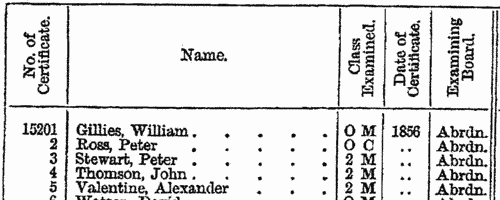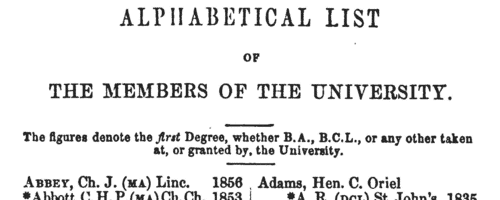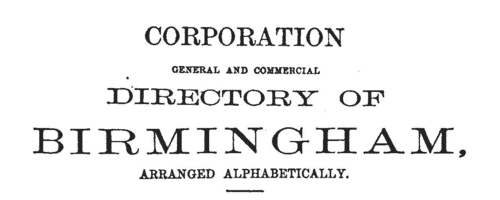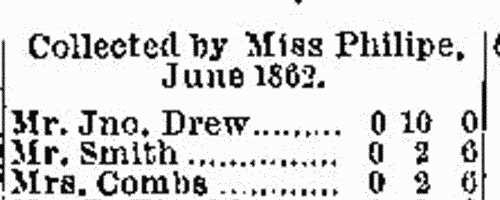Adey Surname Ancestry ResultsOur indexes 1000-1999 include entries for the spelling 'adey'. In the period you have requested, we have the following 252 records (displaying 151 to 160): Single Surname Subscription | | | Buying all 252 results of this search individually would cost £1,474.00. But you can have free access to all 252 records for a year, to view, to save and print, for £100. Save £1,374.00. More... |
These sample scans are from the original record. You will get scans of the full pages or articles where the surname you searched for has been found. Your web browser may prevent the sample windows from opening; in this case please change your browser settings to allow pop-up windows from this site. Unclaimed Dividends
(1855)
The unclaimed dividend books of the Bank of England, containing names and descriptions of over 20,000 persons entitled to many millions of pounds accumulated in the bank unclaimed during the 18th and 19th centuries, mostly in consols and annuities, and transferred to the Commissioners for the Reduction of the National Debt.
ADEY. Cost: £6.00.  | Sample scan, click to enlarge

| Gentry in London
(1856)
The Post Office London Directory for 1856 includes this 'Court Directory', listing alphabetically by surname and christian name the upper class residents of the capital with their postal addresses. 'In order to afford space for the addresses, the abbreviation "esq." for esquire has no longer been appended to each name in the Court Directory. It should be understood that such should be added to the name of every gentleman in the following pages to which no inconsistent addition is affixed.' Decorations, honours &c. are generally given. Some gentlemen appear who are also listed (as professional men, &c.) in the commercial section. Those with second residences in the provinces usually have the country address given as well.ADEY. Cost: £4.00.  | Sample scan, click to enlarge

|  Persons of standing recommending London police recruits
(1843-1857) Persons of standing recommending London police recruits
(1843-1857)
The Metropolitan Police Register of Joiners (MEPO 4/334) lists policemen joining the force 1 January 1843 to 1 April 1857 (warrant numbers 19893 to 35804). The register is alphabetical, in so far as the recruits are listed chronologically grouped under first letter of surname. It gives Date of Appointment, Name, Number of Warrant, Cause of Removal from Force (resigned, dismissed, promoted or died), and Date of Removal. Although the register was closed for new entrants at the end of 1842, the details of removals were always recorded, some being twenty or more years later. Those recruits not formerly in the police, the army, or some government department, were required to provide (normally) at least two letters of recommendation from persons of standing, and details of these are entered on the facing pages. Where a recruit was only recently arrived in the metropolis, the names and addresses of the recommenders can be invaluable for tracing where he came from. Those recruits not formerly in the police, the army, or some government department, were required to provide (normally) at least two letters of recommendation from persons of standing, and details of these are entered on the facing pages: the names in these are indexed here (the police recruits are indexed separately and not included here). Recruits transferred from other forces or rejoining the force did not normally need recommendations - in the latter case, former warrant numbers are given - but some recommendations are from police inspectors, even other constables. Recruits coming from the army sometimes have general military certificates of good conduct, but most often have a letter from their former commanding officer; recruits recommended by government departments (most often the Home Office) similarly have letters from the head of department. But the great majority of the names and addresses in these pages are of respectable citizens having some sort of personal acquaintance with the recruit. Where more than two recommendations were provided, the clerk would only record one or two, with the words 'and others'. Tradesmen are sometimes identified as such by their occupations; there are some gentry. Although the bulk of these names are from London and the home counties, a scattering are from further afield throughout Britain and Ireland. ADEY. Cost: £8.00.  | Sample scan, click to enlarge

|  Sailors and marines awarded the Baltic Medal
(1854-1857) Sailors and marines awarded the Baltic Medal
(1854-1857)
During the Crimean War, a British and French fleet entered the Baltic, and captured Bomarsund harbour and one of the Aland Islands (now part of Finland). Bomarsund is the sound between the islands and the Swedish island of Vardo; and at the fine harbour on Bomarsund, dominating the entrance of the Gulf of Bothnia, and indirectly that of the Gulf of Finland, the Russians had constructed a northern naval base, and this was destroyed in the attack. The British fleet taking part in the Baltic expedition comprised Her Majesty's ships Aeolus, Ajax, Alban, Algiers, Amphion, Archer, Arrogant, Basilisk, Belleisle, Blenheim, Boscawen, Bulldog, Caesar, Calcutta, Centaur, Colossus, Conflict, Cornwallis, Cossack, Cressy, Cruizer, Cuckoo, Cumberland, Dauntless, Desperate, Dragon, Driver, Duke of Wellington, Edinburgh, Esk, Euryalus, Exmouth, Falcon, Firefly, Geyser, Gladiator, Gorgon, Hannibal, Harrier, Hastings, Hawke, Hecla, Hogue, Imperieuse, James Watt, Leopard, Lightning, Locust, Magicienne, Majestic, Merlin, Miranda, Monarch, Neptune, Nile, Odin, Orion, Otter, Pembroke, Penelope, Pigmy, Porcupine, Prince Regent, Princess Royal, Pylades, Resistance, Retribution, Rhadamanthus, Rosamond, Royal George, Royal William, Russell, St George, St Jean D'Acre, St Vincent, Sphinx, Stromboli, Tartar, Termagant, Tribune, Tyne, Valorous, Volage, Volcano, Vulture, Wrangler and Zephyr. This is the medal roll of the naval and marine claimants who qualified for the Baltic Medal for service in 1854 to 1855. The medals were dispatched in batches from early 1857, the first batch being numbered B A 1, the next B A 2, &c.; then follows the destination (a place or, more usually, a ship) and the date of dispatch. Most of the medals had been sent by the end of 1857.ADEY. Cost: £8.00.  | Sample scan, click to enlarge

| Masters and Mates of Merchantmen: Certificates of Competency
(1857)
The Mercantile Navy List and Annual Appendage to the Commercial Code of Signals for All Nations, edited by J. H. Brown, was published By Authority in 1857. It includes this full list of 'Masters and Mates who have passed their examination and obtained Certificates of Competency', from number 1 to number 15816, except for those whose certificates had been cancelled. The first column gives the number of certificate; the second column full name, surname first (an asterisk before the name denotes those who are found qualified to act in fore and aft-rigged vessels only; two vertical lines denotes in North Wales fishery only; a double dagger, passed the examination in steam; and a dagger refers to honorary testimonials, details of which are printed at the end of the section. A B C D are the distinguishing letters for the four classes of Meteorological Observers); third column, class examined (1 ex, 1, 2 and 3 denote First Extra, First, Second and Third Class Master's Certificate, granted under the Voluntary Examination, by Order in Council dated August 1845; Ex C, Master Extra; O C, Master Ordinary; 1 M, First Mate; O M, Only Mate; 2 M, Second Mate; L. R. N., Lieutenant Royal Navy; M. R. N., Master Royal Navy; E. I. C., East India Company; M. I. N., Master Indian Navy.); fourth column, year of certificate (where there are two dots, this is to represent a 'ditto' to the year next above); fifth column, Examining Board (Aberdeen, Belfast, Bristol, Cork, Dublin, Dundee, Glasgow, Greenock, Hull, Leith, Liverpool, London, Newcastle, Plymouth, Shields or Sunderland).ADEY. Cost: £4.00.  | Sample scan, click to enlarge

| Voters in Wimborne district of Dorset
(1857)
The poll book of the county of Dorset for the general election of 3 April 1857 lists all the actual voters: the first column gives the man's number on the electoral register; then the voter's name in full (surname first); residence; qualification (C. for Copyhold, F. for Freehold, L. for Leasehold, O. for Occupier), and then 1s for the votes cast (Se for Henry Ker Seymer, F for Mr Floyer, St for Henry G Sturt, P for William H Berkley Portman).ADEY. Cost: £4.00.  | Sample scan, click to enlarge

| Members of Oxford University
(1860)
The Oxford University Calendar for 1860 includes this list of all living members of the university, i. e. not only undergraduates and members of staff, but also all surviving graduates from earlier generations. The names are arranged alphabetically by surname, then by college in order of foundation. Surnames are given, initials, highest degree, name of college, and then the year of graduating the first degree. For undergraduates only name and college is given. An asterisk before a surname indicates a member on the foundation of the college. ADEY. Cost: £4.00.  | Sample scan, click to enlarge

| Long-stay Paupers in Workhouses: Warwick
(1861)
This comprehensive return by the Poor Law Board for England and Wales in July 1861 revealed that of the 67,800 paupers aged 16 or over, exclusive of vagrants, then in the Board's workhouses, 14,216 (6,569 men, 7,647 women) had been inmates for a continuous period of five years and upwards. The return lists all these long-stay inmates from each of the 626 workhouses that had been existence for five years and more, giving full name; the amount of time that each had been in the workhouse (years and months); the reason assigned why the pauper in each case was unable to sustain himself or herself; and whether or not the pauper had been brought up in a district or workhouse school (very few had). The commonest reasons given for this long stay in the workhouse were: old age and infirm (3,331); infirm (2,565); idiot (1,565); weak mind (1,026); imbecile (997); and illness (493). ADEY. Cost: £6.00.  | Sample scan, click to enlarge

| Residents and Traders in Birmingham
(1861)
William Cornish's Corporation General and Trades Directory covered Birmingham, Coventry and the towns of the Black Country. The Birmingham section contains both street lists and this general alphabetical directory. ADEY. Cost: £4.00.  | Sample scan, click to enlarge

| Missionaries and contributors
(1863)
The Evangelical Magazine and Missionary Chronicle records the work of Christian missionaries throughout the world, and of the supporting missionary societies collecting money for the work in the British Isles. Contributions are listed by congregation, and by family members making donations.ADEY. Cost: £8.00.  | Sample scan, click to enlarge

|
Research your ancestry, family history, genealogy and one-name study by direct access to original records and archives indexed by surname.
|













